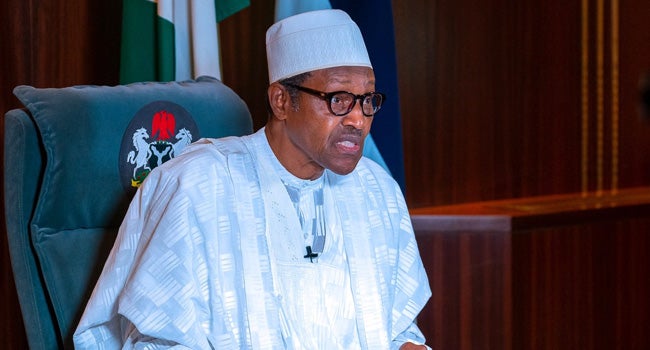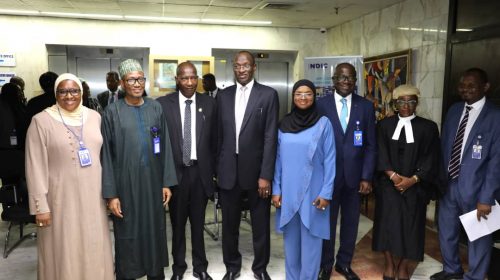Budget 2020: FG in fresh bid to borrow N5.51trn

•Increases debt servicing from N2.4trn to N3trn •Senate to give accelerated approval next Tuesday •Labour, CSOs, experts worry over rising debt profile, servicing •Want govt to stop borrowing to finance consumption •Borrowing in crisis time to finance recurrent expenditure bad — Experts
THE Federal government has asked the National Assembly to approve a total of N5.51 trillion external borrowing to fund its revised 2020 budget. With the new request, Nigeria’s total debt will be around N41.6 trillion when approved. Earlier this year, a similar request was approved by the National Assembly amounting to $22.798 billion (N8.7 trillion) which added to the 2019 year end figure of N27.4 trillion.
The new request also indicated that the government has reversed its earlier move to drastically slash the already passed 2020 budget by over N1.5 trillion to N9trillion from N10.594trillion. The reduction is now N85billion with a new proposal of N10.51 trillion. By the new request, debt servicing has now gone up to about N3.0 trillion from N2.4trillion earlier approved in the 2020 budget. The new Appropriation Bill sent to the Senate, yesterday, by President Muhammadu Buhari, which scaled Second Reading immediately, also indicated a revision of key macroeconomic parameters, while projected oil revenues for 2020 was significantly reduced. In separate letters to the two chambers of the National Assembly, the revised budget was predicated on oil price benchmark of $25 dollar per barrel as against $57per barrel in the earlier approved budget and the first revised benchmark of $30.
Other assumptions of the revised N10 509trillion budget are 1.98million barrels oil production per day as against 2.3million barrel oil production per day earlier appproved, exchange rate of N360 to a US dollar as against N305 to the US dollar earlier passed and approved. Other critical components of the newly proposed N10.509trillion budget are N398.505 billion as statutory transfers , N4.928.525trillion as recurrent expenditure and N2.230.912trillion as capital expenditure. Buhari in the letter explained further that aggregate revenue for funding the now revised 2020 budget is N5.09trillion which is 35% or N2.78trillion less than the one passed by the National Assembly and signed into law by him in December 2019. Debt trend since 2015 As at the first quarter of the Buhari administration, which was the end of June 2015, the national total public debt stock stood at N12. 118 trillion, about $63. 806billion. That amount consisted of N10.083 trillion domestic debt and an external debt of $10. 316 billion. The external debt was what both the federal government and the sub-nationals owed foreign creditors. While the Federal Government’s domestic debt stood at N8.396 trillion, states and the Federal capital Territory owed N1.690 trillion.
By the third quarter of that year, domestic debt moved marginally to N10. 267 trillion, with the Federal Government accounting for NN8. 612 trillion and sub-nationals responsible for the balance of N1.655 trillion. The external debt inched to $10. 617 billion, bringing to total debt stock to N12. 358 trillion or $64. 197 billion. However, by the first quarter of 2016, the total debt stock jumped to N13. 830 trillion or $71. 656 billion. It consisted of federal government’s N9. 970 trillion domestic debt and those of states with N1. 656 trillion, as well as an external debt of $11. 194 billion.
At the end of that year, the debt stock took another leap to N17. 360 trillion, with the Federal Government, accounting for N11.058 trillion and states N2.822 trillion. The external debt also moved to $11.406 billion. 2017 closed with a debt stock of N21.725 trillion. It consisted of the federal government’s N12. 589 trillion and states’ N3.348 trillion. Similarly, at the end of that year, external debt had risen to $18. 913 billion. The rise has persisted with 2018 opening quarter recoding N22.707 trillion debt stock and closing in the fourth quarter with N24. 387 trillion or $79. 436 billion. Last year (2019) witnessed another sharp rise from the first quarter figure of N24. 947 trillion to its last quarter with a stock of N27. 401 trillion of $81. 274 billion.
New budget details
Part of the N85billion reduced from the earlier approved 2020 budget is N11billion deducted from the N110billion capital votes allocated to the Judiciary in the previous budget.
The Bill was referred by the President of the Senate, Senator Ahmad Lawan to the Senator Olamilekan Adeola, All Progressives Congress, APC, Lagos West Led Senate Committee on Finance to report back at Plenary next week Tuesday, an indication that the Bill will be read the third time and passed. In lead debate on the general principles of the Bill, Senate Majority Leader, Senator Yahaya Abdullahi, APC, Kebbi North said that 2020 Appropriation Act (Amendment) Bill is now predicated on Oil production of 1.93 million barrels per day and a benchmark oil price of $25 dollar per barrel. According to him, the official exchange rate has also been adjusted upwards to N360/ US$1 by the Central Bank of N igeria (CBN). At the Importers and Exporters Foreign Exchange (IEFX) window, where the bulk of foreign exchange transactions are consummated, the exchange rate recently depreciated from about N360/ US$1 in January, 2020 to over N385/US$1.
The budget bill has also adjusted downwards non-oil revenue projections, including various tax and customs receipts. Additionally, the First-Line deductions by NNPC for Federally Funded Upstream Projects/Expenditures have been significantly reduced by 65% from N1.223 trillion to N424.23 billion. According to him, they include the removal of N457.50 billion provision for premium motor spirit (PMS) under-recovery, With the re-introduction of a Price Modulation Mechanism (tied to international price movement) as the basis for pricing PMS going forward. He said that, “The aggregate revenue available to fund the 2020 budget is now projected at N5.09 trillion (35% or N2.78 trillion less than 2020 Budget passed by National Assembly)” The Senate leader who noted that “26% of this is projected to come from oil related sources while the balance is to be earned from non-oil sources, said that provision of Stamp Duty was reduced to N200 billion from N463.95 billion, while Signature Bonus is down to N350.52 billion from N939.30 billion.
According to the revised budget bill, “some non essential and deferrable expenditure (especially those classified as Administrative Capital Expenditure) were reduced in favour of growth enhancing, pro-poor funding expenditures and social sector investments in order to combat the current Pandemic as well as its negative impacts on the economy” He further explained that provisions for sinking fund to retire maturity bonds to Local Contractors/Creditors is N272.9 billion, just as he said that the provisions for Personnel and Pension cost was retained at N2.83 trillion and N536.72 billion respectively. He said, “The sum of N25.56 billion (representing 1% of the Consolidated Revenue Fund) has been provided for the Basic Health Care provision Fund.
Other critical provisions such as N22.73 billion for routine immunization in the Service Wide Votes and N81.14 billion for the Power Sector Reform Programme has been retained.” According to him, “the aggregate amount available for the Capital Expenditures (exclusive of Capital in Statutory Transfers) in this reverse 2020 budget is N2.23 trillion, consisting of N1.264 trillion for MDAs, N100.3 billion for Covid-19 Expenditures, N20 billion for Capital Component for the Special Intervention Programme, N274.85 billion for other Capital supplementation, N141.17 billion Capital Budget for Ten GOES, N42.96 for Donor Grant Funded Expenditures and N387.30 billion funded by Project-Tied Loans.
The Senate leader lead debate read, “you will recall that the President C-in-C through a communication to the President of the Senate forwarded the 2020 Appropriation Act (Amendment) Bill, 2020 to the Senate which was read at the floor of the Senate today Thursday, 28th May, 2020 by the President of the Senate. The Bill was read for the first time in this Chamber by virtue of Mr. President’s communication. “You will recall that 2020 Budget was predicated on Oil production of 2.18 million barrels per day and a benchmark oil price of $57 dollar per barrel and an exchange rate of N305 to a dollar.
“Following the outbreak of the Coronavirus Disease (Covid-19), and its rapid spin into a global Pandemic in Q1 2020, there has been corresponding economic consequences. There has been a slow-down of global economic activities as most countries are on lockdown with movement only limited to essential goods or persons performing essential services.
Correspondingly, international oil prices have plunged triggered by the Saudi-Russia Oil War and weakening global demand. “Further to the above, most of the assumptions underpinning the 2020 FGN Budget have had to be revised in the face of current realities, as Nigeria is vulnerable to the current global economic disruption caused by the Covid-19 crisis which has led to decline in Crude-oil prices and spikes in risk aversion in the global capital markets. “Prior to the outbreak of Covid-19 Pandemic, the Nigerian economy had been characterized by wavering external sector and improving internal economic indicators.
Over-dependence on oil revenue, constrained fiscal space, low foreign and domestic investments and declining foreign reserves made the economy disproportionately vulnerable to the twin shocks of crude oil price/production collapse and a health crisis affecting negatively the informal sector which accounts for over half of the Nigeria’s GDP. “Currently Nigeria’s foreign reserves have declined to USD 35.9 billion in March, 2020 from USD 44.7 billion in April, 2020. The decrease is largely attributable to the impact of the decline in crude oil receipts. “The uncertainty and general decline in global economic activities caused by the Covid-19 Pandemic have further dimmed the prospect of reversing the downward trend in foreign portfolio investments (FPIs) in the Nigerian Treasury Bills (NTBs), also adversely impacted by the Covid-19 inspired flight to safety, represent the second biggest source of dollar inflow into the country after crude oil. “Following the revision of key macroeconomic parameter, projected oil revenues for 2020 have been significantly reduced. Adjusted downwards also are non-oil revenue projections, including various tax and customs receipts. Additionally, the First-Line deductions by NNPC for Federally Funded Upstream Projects/Expenditures have been significantly reduced by 65% from N1.223 trillion to N424.23 billion.
These cuts include the removal of N457.50 billion provision for premium motor spirit (PMS) under-recovery, with the re-introduction of a Price Modulation Mechanism (tied to international price movement) as the basis for pricing PMS going forward. “The aggregate revenue available to fund the 2020 budget is now projected at N5.09 trillion (35% or N2.78 trillion less than 2020 Budget passed by National Assembly). 26% of this projected to come from oil related sources while the balance is to be earned from non-oil sources. The provision of Stamp Duty was reduced to N200 billion from N463.95 billion, while Signature Bonus is down to N350.52 billion from N939.30 billion.
With the retained revenues of the ten major Government-Owned Enterprises (GOEs), the aggregate FGN revenue is projected at N5.56 trillion. “In order to forestall, or at least slow down, a decline into another recession, the Federal Government did not set out to implement an austerity-style cuts in expenditure.
However, in a bid to reprioritize government spending, some non-essential and deferrable expenditure (especially those classified as Administrative Capital Expenditure) were reduced in favour of growth-enhancing, pro-poor funding expenditures and social sector investments in order to combat the current Pandemic as well as its negative impacts on the economy. READ ALSO: The 9.6bn P&ID award ― Matters arising “The FGNs expenditure budget (including grants and donor funding) is estimated at N10.51 trillion (inclusive of project-tied loan financed projects and expenditures of ten GOEs), down from N10.59 trillion in the 2020 Appropriation Act. Debt services is estimated at N2.68 trillion while provisions for sinking fund to retire maturity bonds to Local Contractors/ Creditors is N272. 9 billion. The provisions for Personnel and Pension cost was retained at N2.83 trillion and N536.72 billion respectively.
The sum of N25. 56 billion (representing 1% of the Consolidated Revenue Fund) has been provided for the Basic Health Care provision Fund. Other critical provisions such as N22.73 billion for routine immunization in the Service Wide Votes and N81.14 billion for the Power Sector Reform Programme has been retained. “The aggregate amount available for the Capital Expenditures (exclusive of Capital in Statutory Transfers) in this reverse 2020 budget is N2.23 trillion, consisting of N1.264 trillion for MDAs, N100.3 billion for Covid-19 Expenditures, N20 billion for Capital Component for the Special Intervention Programme, N274.85 billion for other Capital supplementation, N141.17 billion Capital Budget for Ten GOEs, N42.96 for Donor Grant Funded Expenditures and N387.30 billion funded by Project-Tied Loans. “The 2020 Appropriation Act (Amendment) Bill is now predicated on Oil production of 1.93 million barrels per day and a benchmark oil price of $25 dollar per barrel. “The official exchange rate has also been adjusted upwards to N360/US$1 by the Central Bank of Nigeria (CBN). At the Importers and Exporters Foreign Exchange (IEFX) window, where the bulk of foreign exchange transactions are consummated, the exchange rate recently depreciated from about N360/US$1 in January, 2020 to over N385/US$1.
While the CBN continues to make strenuous efforts to stabilize the exchange rate, it is generally expected that the Naira will suffer further devaluation as Nigeria is projected to lose about US$26 billion in oil revenues, its principal source of foreign currency. “I believe that all the proposals in this Revised 2020 Appropriation Bill, are laudable and imperative to support economic activities and mitigate the diverse effect of the Covid-19 shocks as well as enhance the critical needs of the citizens of this country.” Labour, CSOs, experts react Reacting to Nigeria’s current debt profile yesterday, Organised Labour, Civil Society Organizations, CSOs, and financial experts expressed concerns over how the debt could be serviced, in view of the expected short fall of revenue by the Federal Government caused by declining oil prices. The Organised Labour, CSOs also stated that the current total debt profile was almost at par with what the nation owed the Paris Club before the debt amnesty of about US$18 billion from a total debt stock of US$35.994 billion. Labour and CSOs called for an immediate stop to the practice of borrowing to finance consumption, arguing that where necessary, foreign loans should be tied exclusively to capital projects with feasible income and debt repayment potential. In a communiqué by President and General Secretary of NLC, Ayuba Wabba and Emma Ugboaja, respectively, at the end of a meeting of “Labour Civil Society Situation Room on COVIDd-19”, said: “We are concerned that the decision to downsize the budgetary provisions for health, education, agriculture and infrastructure and freeze new recruitments in all the Ministries, Agencies and Departments of government except those in the health and security sectors, would make economic recovery from the COVID-19 crisis more difficult. ‘’The Situation Room is also worried that the over-padded emoluments of political leaders in Nigeria remain untouched, including their unregulated access to security votes.
The Situation Room also bemoans the incongruities in our public budgeting system. ‘’The persistence of unwieldy recurrent expenditure, replication of similar cost centres, and insertion of vague cost items in the budget indicate an entrenched and thriving culture of official sleaze through budgeting. ‘’The Situation Room also noted the resort to increased foreign borrowing as a way out of the current economic quagmire. Just before the COVID-19 pandemic in Nigeria, Nigeria’s external debt had hit a 16-year high of US$27 billion, with a debt servicing commitment of US$1.5 billion per annum, which is about 5% of our 2020 federal budget and 75% of our external reserves. “It is of great concern that our current total debt profile is almost at par with what we owed the Paris Club before the debt amnesty of about US$18 billion from a total debt stock of US$35.994 billion. ‘’CBN records show that the Federal Government borrowed over N4.4 trillion by ways and means in 2019. This is far beyond the maximum of N4.5 billion allowed in CBN legal statutes. ‘’We are also concerned about the debt crisis facing the private sector.
The withdrawal of labour from the production chain, owing to COVID-19, meant that loans sourced for production have been lying idle or are trapped as raw materials without value benefit. “While this situation once again re-echoes the fact that labour is the real creator of surplus value and wealth, it is important for government to address the debt challenge in order to save jobs; Scrap Security Votes from public budgeting ‘’The Situation Room expressed concerns that while different tiers of government seek to boost their internally generated revenue amidst the current crisis, incidences of infringement on statutory revenue sources for the lower tiers of government, particularly the local government councils would likely be on the increase. ‘’We are also worried that recent public financial audits show a gale of widespread mismanagement of government revenues.
Given the abuse of security votes by many political office holders in the executive branch of government, we call for the scrapping of security votes from public budgeting in Nigeria. ‘’Security votes should be appropriated and accounted for like every other budget item. We call on political office holders to reduce their salaries and allowances in order to free up finances for other areas of national developmental needs. We also call for an end to medical and education tourism for elected public officials and their families. ‘’We call for an immediate stop to the practice of borrowing to finance consumption.
We call for foreign loans where necessary to be tied exclusively to capital projects with feasible income and debt repayment potential cum projections. ‘’We call for support to the private sector operators struggling with “trapped loans”. We call on government to grant moratorium on accruing interests and repayment schedule for such loans. “Government can also buy back “trapped loans” and mediate more flexible repayment plans for private sector operators; and we call for accelerated disbursement of palliatives and loans to workers in the informal sector. This should be transparent and inclusive and monitored by mass-based groups.
Also, conditions for access to the loans should be minimal to deepen access.” Reacting to the debt profile, Ayo Akinwunmi, Senior Relationship Manager, Corporate Banking Department, FSDH Merchant Bank Ltd, said: “If Nigeria has a revenue shortfall, as we have now, the only way to go about it is to ensure that government meets its obligations to various people and projects. ‘’I don’t have problem with borrowing if the borrowed fund will increase the capacity for the economy to repay and earn additional revenue and allow business to expand.
And the good thing about this plan is that the borrowings are from organisations whose terms and conditions are not purely commercial. ‘’Yes, government public debt is growing, what government should do is to ensure more transparency in the use of the borrowed fund to earn public confidence and also to eliminate any projects or programmes that can be undertaken by the private sector operators so that the government’ cash requirements will go down.|
” In his response, Marcel Okeke, Former Chief Economist, Zenith Bank Plc and Chief Executive Officer/Lead Consultant, Mascot Consult Limited said:”Really, the 2020 budget is already messed up by funding challenges; the price of oil has crashed to unimaginable levels of US$25.35 per barrel, from an earlier projection of US$57pb for the 2020 budget. So, certainly there is a very huge funding gap. But, given the nation’s huge outstanding debt that runs into billions of dollars, there is serious cause to worry that much more money is being borrowed.
The question is: how do we service these loans (principal + interest), especially now that our crude oil will be bringing in very little. I pray our major creditors do not begin to seize our national assets, when we’re unable to pay—which is what is already happening in Southern African, where China is practically “recolonising” some countries. “Agreed the said loan of US$5.513Billion is expected to come on very concessionay terms (and, perhaps, with some moratoria), their addition to exiting huge public debt poses serious fiscal danger.
However, all said, the economic blueprint that the Govt shall put in place after covid-19, will, to a great extent, determine the ‘entire shape’ of the Nigerian economy. Certainly, a “new economy” must emerge.” The Managing Director/Chief Executive Officer, APT Securities Limited, Mr Garba Kurfi said: “This is mere formality since the $3.4 billion is already being collected from IMF and the other loans were already being processed by FGN. To me it’s not a new thing since the loans are already being processed. This is necessary in order to mitigate the short fall of the Crude oil money due to low quantity and price. We also expect short fall from Remittance of Diaspora. That may enable FGN to retain the exchange rate.” In his comment, the Managing Director of Sofunix Communications and Investment Limited, Sola Oni said: “The Federal Government’s penchant for external borrowing is fast becoming worrisome.
On the face of it, this can expedite action on implementation of projects but it is not without a feet of clay. Now that the Naira has been tactically devalued, it stands to reason that excessive external borrowing will push up interest payment, reduce Nigeria’s Gross Domestic Product (GDP) because the monetary payment is an outflow, discourage foreign and private investment and lead to further downgrade in the Country’s credit rating. Continuing, he said: “Government should begin to look inward, especially the capital market. The market has absorptive capacity to generate huge amount of fund with multiplier effect of deepening the market. The time is now.”
Reacting Victor Chiazor, Managing Director, FSL Securities, said that the federal government’s request to the National Assembly, NASS to raise fresh external borrowing to the tune of $5.5 billion is not a surprise, arguing that the government does not have the financial resources to fund the revised 2020 budget. He said: “The major concern is the ability of the government to repay the debt without putting the economy into a debt crisis. He said: “Given the drop in oil prices and a slowdown in economic activities, government revenues from oil and other sources will definitely be lower but the reality is that the government must keep running its affairs.
The issue is not with the borrowing but what the borrowings are meant for and the ability of the country’s revenue to repay its debt obligations without pulling the economy into a debt crisis. “A significant portion of the funds intended to be borrowed must be channelled into building critical infrastructure that can support and grow the economy as against spending the funds on recurrent expenditures.
At this point, critical infrastructure needed for the country to grow organically needs to be put in place to enable it become a producing economy capable of exporting to the world market and move away from being a consuming economy.” Also, in his own reaction, Executive Vice Chairman, High Cap Securities Limited, David Adonri said: “President Buhari is taking Nigeria deeper to foreign debt trap. The only means of repayment is proceeds from crude oil export. But crude oil market will shrink as industrialized nations convert to clean energy.
This President is mortgaging the future of Nigeria with collaboration of APC. I pity those that are granting these loans because they cannot be repaid. Borrowing in the midst of crisis to finance recurrent expenditure is ill advised. Government ought to revise the budget downward to the level the country can afford. Meanwhile, there is nothing concrete on ground to justify previous borrowings and huge budgets.”
Vanguard






Leave a Reply